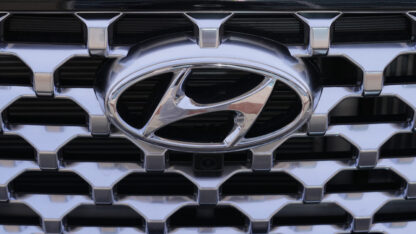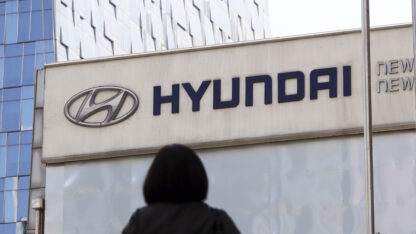A top Hyundai executive said Tuesday that the company is rushing to start electric vehicle and battery production as soon as possible at a $7.6 billion complex in coastal Georgia, spurred by federal electric vehicle incentives that reward domestic production.
Hyundai President and Global Chief Operating Officer Jose Munoz made the remarks to reporters in Atlanta after signing a partnership with Georgia Tech aimed at strengthening research into hydrogen-fueled vehicles and producing workers for the Korean company. Among the attendees was Euisun Chung, executive chairman of parent Hyundai Motor Group.
The group, which also makes Kia and Genesis vehicles, has complained that the Inflation Reduction Act is unfair to companies importing electric batteries or vehicles from outside North America. The massive federal law, one of President Joe Biden’s signature accomplishments, is aimed in part at combating climate change. The law provides a tax credit that saves EV buyers up to $7,500, but only on cars made in North America with domestic batteries.
Hyundai and other companies selling imported vehicles have still been helped by the law because dealers can apply the credit to any leased electric vehicle, no matter where it’s made, to reduce a customer’s monthly payment. Munoz on Tuesday presented figures showing the Hyundai group sold or leased the second biggest number of electric vehicles in the U.S. in the first six months of 2023, behind only Tesla.
Still, the law is pushing Hyundai to make batteries and electric vehicles in the U.S. more quickly, Munoz said, with the company speeding up construction in an attempt to start production in Georgia sometime in 2024.
“What we decided is to double down,” Munoz said. “We try to accelerate as much as possible, the project. And we are confident that the original date of January 2025 would be probably pulled ahead maybe three months or so. If we can, even more.”
The South Korean automaker and battery partner LG Energy Solution recently increased their investment in battery production at the complex by an additional $2 billion. They also pledged to hire another 400 workers, increasing total employment to 8,500. Munoz said the investment will allow the company to make more batteries in Ellabell than originally planned, raising capacity enough to supply batteries for all 300,000 vehicles that Hyundai plans to assemble there.
“We would like to ensure that the sourcing of the batteries is 100% USA in order to comply with the IRA,” Munoz said, adding that the increased investment would also make sure Hyundai and LG used “the best possible technology” to make batteries.
Munoz said construction is progressing rapidly at the plant outside Savannah and wasn’t affected by last month’s Hurricane Idalia. Hyundai could qualify for $2.1 billion in state and local tax breaks, pledging to pay workers a yearly average of $58,105, plus benefits.
Munoz emphasized the company’s commitment to fully electric vehicles, saying it will keep making gasoline-electric hybrid vehicles for now, but saying Hyundai sees customers using hybrids as a “stepping stone” to vehicles without a gasoline-burning engine. Some other automakers, like Toyota Motor Co., have focused efforts on plug-in hybrids.
He said the company is looking to fuel heavy-duty trucks and long-distance vehicles with fuel cells that convert hydrogen into electricity through a chemical reaction.
“So, battery EV is great for passenger cars and commuting, but the fuel cell EVs, based off of hydrogen, are the best technology we see for a heavy duty and then a very long range,” Munoz said.
The company hopes Georgia Tech’s research expertise in hydrogen can help Hyundai advance the technology, part of the agreement it signed Tuesday. Hyundai already makes hydrogen-fueled heavy trucks in South Korea and Georgia state officials recently asked for proposals on creating hydrogen fueling stations along Interstate 16 between the Hyundai plant and Savannah’s port.
Tuesday’s agreement, which Georgia Tech President Angel Cabrera described as “a big deal for us” is also supposed to open a pipeline for graduates to seek jobs at Hyundai.
“More and more the jobs we’re bringing are highly skilled, highly qualified,” Munoz said. “If you see how our plant is going to operate, it’s like a lab. So we need a lot of young talented people.”









